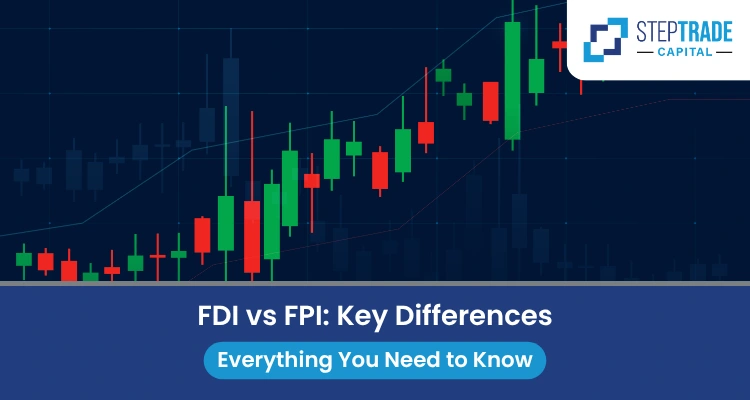Understanding international capital is essential for any investment advisor, wealth manager, or institutional investor. Two terms come up constantly: Foreign Direct Investment (FDI) and Foreign Portfolio Investment (FPI). While both involve money moving across borders, what they are for, their impact, and their strategic use are completely different.
The main difference between FDI and FPI comes down to control. FDI is a strategic, long-term investment made to acquire a substantial interest and active role in a foreign enterprise. In contrast, FPI is a more passive, short-term investment in financial assets like stocks and bonds, primarily for financial returns without direct operational control. Here at Steptrade Capital, we guide our clients through these complexities, ensuring their global investment strategies align perfectly with their objectives.
What is Foreign Direct Investment (FDI)?
Foreign Direct Investment (FDI) is a direct investment from an investor in one country into a business in another. The purpose is to establish a lasting presence and influence the company's management and operations.
An investment is typically classified as FDI when the foreign investor acquires 10% or more of the voting power in an enterprise. This threshold, recognized by organizations like the OECD and IMF, signifies that the investor has gained an "effective voice" in the company's management, moving beyond a purely passive financial stake.
FDI can take several forms, each with distinct strategic goals. Greenfield investments involve building new facilities from the ground up. Mergers & acquisitions (M&A) involve purchasing an existing foreign company. Joint ventures are strategic alliances where a foreign and a local company share ownership and control of a new entity.
The primary drivers of FDI are typically multinational corporations (MNCs) and large private equity firms. Their motives are strategic and long-term, focused on gaining new market access, acquiring raw materials, optimizing production costs, and transferring technology or management expertise to new regions.
What is Foreign Portfolio Investment (FPI)?
Foreign Portfolio Investment (FPI) consists of an investor purchasing foreign financial assets. These investments are highly liquid and are not made with the intent to actively manage or control the underlying company.
FPI encompasses a wide range of securities that can be easily traded on public exchanges. This includes stocks (equities), government and corporate bonds (debt), exchange-traded funds (ETFs), and depository receipts like American Depository Receipts (ADRs) and Global Depository Receipts (GDRs).
FPI is dominated by institutional investors such as mutual funds, hedge funds, pension funds, and insurance companies. Their primary motivation is financial gain through capital appreciation and dividends, portfolio diversification across different geographies, and the ability to enter and exit markets quickly.
The defining features of FPI are its high liquidity and short-term nature. FPI investors are not involved in the day-to-day running of the companies they invest in. This "hands-off" approach allows for rapid reallocation of capital based on changing market conditions, making it more volatile than FDI.
What Are the Core Differences Between FDI and FPI?
Understanding the distinctions is crucial for crafting an effective international investment strategy. While both are vital sources of foreign capital, they serve different purposes and carry different risk profiles. Here is a direct comparison:
| Feature | Foreign Direct Investment (FDI) | Foreign Portfolio Investment (FPI) |
|---|---|---|
| Control & Influence | Active. Investors has significant influence or control. ,/td> | Passive. Investor has no say in company management. |
| Investment Horizon | Long-term. A strategic, lasting commitment. | Short-term. Can be bought and sold quickly. |
| Liquidity | Low. Difficult and slow to exit the investment. | High. Assets are easily traded on public markets. |
| Economic Impact | Transfers technology, skills, and creates jobs directly. | Increases market liquidity and capital availability. |
| Investor's Goal | Strategic growth, market entry, operational control. | Financial returns, portfolio diversification. |
| Volatility | Stable. Considered "sticky" capital that doesn't flee quickly. | Volatile. Often called "hot money" due to rapid inflows/outflows. |
| Entry & Exit | Difficult. Requires significant due diligence and process. | Easy. Can be executed through a standard brokerage account. |
How Do Governments Regulate FDI and FPI?
Governments treat FDI and FPI very differently due to their varying impacts on the economy. Policies are designed to attract stable, long-term FDI while managing the potential volatility of FPI.
How are ownership thresholds used in regulation?
The 10% ownership rule is a key benchmark. Investments below this threshold are generally treated as FPI, subject to securities market regulations. Once an investment crosses this line, it is often reclassified as FDI, triggering different approval processes, reporting requirements, and potentially sectoral ownership caps.
What are the approval routes for foreign investors?
Most countries have two primary routes for FDI: the automatic route, where pre-approval is not needed for most sectors, and the government approval route, required for sensitive sectors like defense, media, or telecommunications. FPI, on the other hand, typically just requires registration with the country's securities regulator (like SEBI in India for FPIs).
How Do FDI and FPI Influence Capital Markets?
Both types of investment are critical for a nation's economic health, but their effects are felt in different ways and over different timeframes.
FPI flows have a direct and immediate impact on capital markets. Large inflows can boost stock market indices and strengthen the local currency, while sudden outflows can trigger market crashes and currency depreciation. This volatility is a key reason why central bank monitor FPI closely.
FDI provides long-term, structural benefits that FPI cannot. It brings stable capital for infrastructure and industrial projects, creates direct employment, facilitates the transfer of advanced technology and management skills, and boosts a country's export competitiveness. This makes FDI a cornerstone of long-term economic development strategy.
Which Industries Attract FDI vs FPI?
Different sectors naturally appeal to different types of investors based on their goals.
- FDI is drawn to capital-intensive, strategic sectors like manufacturing (e.g., setting up a car factory), infrastructure (building ports or power plants), technology (R&D centers), and real estate.
- FPI targets sectors with highly liquid, publicly traded companies. This often includes financials (banks), information technology (large-cap tech stocks), consumer goods, and pharmaceuticals.
How Do These Flows Impact SMEs and Alternative Funds?
For the sophisticated clients of Steptrade Capital, understanding the second-order effects on small-to-medium enterprises (SMEs) and Alternative Investment Funds (AIFs) is vital.
FDI can be a game-changer for SMEs, providing growth capital that allows them to scale up, improve technology, and eventually list on public exchanges. For AIFs that invest in unlisted companies, FDI can be a key source of future funding or a potential exit route via acquisition.
FPI, in turn, boosts the overall liquidity and valuation of public markets, including SME-focused exchanges. This increased market depth benefits AIFs that invest in listed securities, creating a more vibrant and efficient ecosystem for all market participants.
Conclusion:
The decision between FDI and FPI is fundamentally a choice between active control and passive participation.
- Choose FDI when your objective is strategic expansion, long-term market presence, and direct operational control over an asset. It is for builders and operators.
- Choose FPI when your goal is portfolio diversification, financial returns, and maintaining high liquidity to react to market trends. It is for traders and financial investors.
Navigating the regulatory, operational, and financial nuances of cross-border investments requires deep expertise. At Steptrade Capital, we provide the strategic advisory our clients need to make informed decisions that drive growth and create lasting value in the global marketplace.















